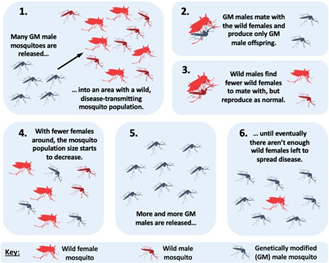

Context
Preliminary results of an open-air study of genetically engineered mosquitoes — with an aim to suppress a wild population of virus-carrying mosquitoes — in the United States have shown promising results.
About
Genetically Modified Mosquito
- A genetically modified insect is an insect that has been genetically modified for various reasons such as agricultural production, oil production and pest control.
- Scientists have moved on from using bed nets and insecticides to kill malaria-spreading mosquitoes, to genetically modify the mosquitoes by inserting a gene that leads to the production of male offsprings.
- Since only females carry the malaria-causing microorganism, the spread of the disease is controlled in the short-term while eventually the whole population gets wiped out.
- Scientists injected a gene from a slime mould into the mosquito which attached itself to the X chromosome during sperm-making process effectively masking the sperms leading to production of male offsprings.
Aim of the Experiment:
The aim of the experiment by Oxitec, a United Kingdom-based biotechnology firm, is to reduce the population of wild Aedes aegypti mosquitoes that is a vector for viruses such as chikungunya, dengue, zika and yellow fever. The scientists engineered a gene that will kill the female offspring.
How GM mosquitoes are produced and used to control Ae. aegypti mosquitoes?
- GM mosquitoes are mass-produced in a laboratory to carry two types of genes:
- A self-limiting genethat prevents female mosquito offspring from surviving to adulthood.
- A fluorescent marker genethat glows under a special red light. This allows researchers to identify GM mosquitoes in the wild.
- GM mosquitoes produced in the laboratory lay eggs. These eggs carry the self-limiting and fluorescent marker genes.
- GM mosquito eggs that carry the self-limiting gene are released into an area. Once they have hatched and develop through to the adult stage, they are available to mate with wild females. The genes are passed on to offspring.
- The female offspring die before they become adults. The expected result is that the number of Ae. aegypti mosquitoes in the area decreases.

Effectiveness of GM mosquitoes in reducing numbers of mosquitoes
- GM mosquitoes have been successfully used in parts of Brazil, the Cayman Islands, Panama, and India to control Ae. aegypti mosquitoes. Since 2019, over 1 billion mosquitoes have been released.
- When GM mosquitoes stop being released into an area, the Ae. aegypti mosquito population will slowly return to “normal levels.”
- GM mosquitoes will only work to reduce numbers of target mosquito species (e.g., Ae. aegypti), no other types of mosquitoes. Most communities have more than one type of mosquito.
Concerns
There are concerns about using tetracycline on a routine basis for controlling the expression of lethal genes. There are plausible routes for resistance genes to develop in the bacteria within the guts of GM insects fed on tetracycline and from there, to circulate widely in the environment.


